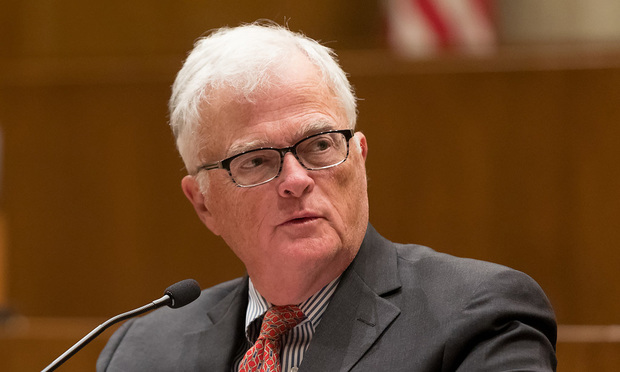Apple and Cisco Take Different Tacks to Tackle Alsup's Fee-Shifting Test
A special master says Cisco refused to follow U.S. District Judge William Alsup's specific instructions for documenting its flat-fee arrangement with two law firms.
March 06, 2020 at 04:39 PM
7 minute read
 U.S. District Judge William Alsup of the Northern District of California. Photo: Jason Doiy/ALM
U.S. District Judge William Alsup of the Northern District of California. Photo: Jason Doiy/ALM
The original version of this report was published on the biweekly IP briefing Skilled in the Art.
Straight Path IP Group's fee litigation with Cisco Systems and Apple is a gift that keeps on giving. What once seemed like a great bar exam question now is starting to feel like a semester-long study on legal ethics, fee shifting and flat-fee arrangements.
To briefly recap, U.S. District Judge William Alsup of the Northern District of California declared Straight Path v. Apple and Straight Path v. Cisco "exceptional" under Section 285 of the Patent Act last November. Straight Path had sought some $95 million in damages from Apple and $41 million from Cisco for allegedly infringing patents on establishing point-to-point communication links.
Alsup slammed Straight Path for taking a position on claim construction during prior litigation before the USPTO and then doing an "about-face" in his courtroom. But he also rejected Apple's and Cisco's combined request for almost $10 million in fees and costs. He especially criticized Apple for "overreaching," saying its request "well illustrates the evil of satellite litigation over attorney's fees motions."
Alsup appointed his former law clerk, BraunHagey & Borden partner Matthew Borden, as special master and told the tech giants to resubmit their fee requests to him.
Apple, which is represented by Hogan Lovells, rose to the challenge as one would expect from the world's most profitable tech company. The company quickly dialed down its request from $3.9 million to $2.69 million. It organized its billings into 100 separate categories representing unique projects in the case, as specifically instructed by Alsup. Apple further deleted all billings related to one of the five patents-in-suit that didn't have claim construction issues and discounted by 80% other billings that related to all five patents as a group.
Consequently, Borden recommended Apple get almost everything it's now asking—$2.33 million of its $2.69 million request, plus an additional $300,000 if Alsup is willing to excuse a technical problem with its request for appellate fees.
Cisco, meanwhile, stuck with its demand for $3.8 million (plus non-taxable costs, which Borden recommended denying). Cisco had flat-fee arrangements in the case, first with Baker Botts and then with Desmarais. The arrangements weren't necessarily fatal to its request, Borden wrote. But Alsup had instructed the parties to provide a "detailed declaration, organized by discrete projects, breaking down all attorney and paralegal time sought to be recovered." Baker Botts submitted the necessary time records, but organized them chronologically, rather than by project. Desmarais didn't submit any detailed time entries at all, according to Borden.
"Instead of the process ordered by the Court, Cisco asks that its fees be compared to recovery in other patent cases and/or evaluated based on the alleged profitability of various law firms," Borden wrote. "These approaches fail to adequately test the reasonableness of the fees Cisco is seeking."
Without detailed entries, there's no way to ensure that counsel isn't working on unrelated matters "as part of an unwritten understanding," Borden wrote.
He recommended cutting Cisco's request in half to $1.9 million. And there's still the possibility Alsup could go further. The judge warned last fall that he would consider deducting three times the amount of any unreasonable fee requests.
Among the multitude of intriguing observations and reveals in Borden's 26-page report and recommendations:
➤ Hogan pitched Apple for the Straight Path work against other law firms. Hogan's senior attorney on the case—apparently partner Clay James—currently bills Apple a discounted rate of $862 an hour, Borden said, which is comparable to the $850 hourly rate claimed by Straight Path's senior attorney on the matter, presumably Russ August & Kabat partner Marc Fenster. "The rates charged by Hogan Lovells are reasonable," Borden wrote. "They are the rates a sophisticated client actually paid. They were generated through a competitive process. They also are consistent with what law firms and lawyers with similar credentials charge."
➤ Cisco did not provide its engagement letter with Baker Botts. "When asked about the circumstances of Baker Botts' retention at the March 3, 2020, hearing, Cisco was unable to provide an explanation," Borden wrote. "It is thus unclear what exactly Baker Botts' monthly fee covered or how it was derived."
➤ Baker Botts' flat fee varied from $100,346.98 per month to $122,022.04 during the first six months of the case, then ramped up to $325,000 as the litigation intensified. "Baker Botts' flat monthly rate only remained constant for three of the 12 months for which it seeks fees, which makes its flat rate look more like a black box than a fee cap," Borden wrote.
➤ Baker Botts' records appeared to show more than 50 entries related to joint defense issues. "Such activities may be reasonable, or perhaps even efficient, but Plaintiff should not have to finance other proceedings," Borden wrote. He noted that he'd found only one joint-defense related entry in Apple's submission.
➤ Desmarais told Borden that it never tracks billable hours, except for pro bono engagements because those are required by New York Rules of Professional Conduct. Desmarais "could have constructed individual time records using emails, calendar entries, its document management system, and other materials, but chose not to do so," Borden concluded.
➤ Cisco had retained Desmarais to cover other matters as well, but represented that it had apportioned its flat fee to $389,588.33 per month to cover the Straight Path matter only. "Cisco does not explain how that apportionment was derived, how many other matters existed, what those other matters were, or what overlaps and synergies there may have been in the representation," Borden wrote. "Nor did it provide any of its engagement letters for purposes of making such an assessment. Nor did it provide any contemporaneous budgets or projections to evaluate how much work Cisco anticipated and how much attorney time it would take to substantiate the reasonableness of this apportionment."
➤ Borden concluded that Baker Botts and Desmarais "no doubt performed substantive work on the case, obtained a good result, and presented declarations as to the commercial value" of their work. But because of the material gaps that remained, he cut Cisco's request by 50%. That "eliminates redundancy and limits the risk of fee stuffing or matter-swapping that can be associated with the kind of flat-fee arrangements employed with its counsel."
➤ Alsup warned last fall that if Cisco's or Apple's submissions included unreasonable requests, he might not only disallow those items, but further deduct three times the amount from the total—or "may possibly deny relief altogether." Borden is not recommending further penalties, even for Cisco. The recommended 50% reduction "arises from a failure in documentation unique to Cisco's attorney-client arrangement and not necessarily from bad faith," Borden wrote. "Accordingly, no further reduction is recommended."
Over to you, Judge Alsup. Time for final exams.
This content has been archived. It is available through our partners, LexisNexis® and Bloomberg Law.
To view this content, please continue to their sites.
Not a Lexis Subscriber?
Subscribe Now
Not a Bloomberg Law Subscriber?
Subscribe Now
NOT FOR REPRINT
© 2025 ALM Global, LLC, All Rights Reserved. Request academic re-use from www.copyright.com. All other uses, submit a request to [email protected]. For more information visit Asset & Logo Licensing.
You Might Like
View All
'A Death Sentence for TikTok'?: Litigators and Experts Weigh Impact of Potential Ban on Creators and Data Privacy

‘Extremely Disturbing’: AI Firms Face Class Action by ‘Taskers’ Exposed to Traumatic Content
5 minute read

Patreon Hit With Lawsuit for Allegedly Diverting Subscriber Data to Meta
Law Firms Mentioned
Trending Stories
- 1'A Death Sentence for TikTok'?: Litigators and Experts Weigh Impact of Potential Ban on Creators and Data Privacy
- 2Bribery Case Against Former Lt. Gov. Brian Benjamin Is Dropped
- 3‘Extremely Disturbing’: AI Firms Face Class Action by ‘Taskers’ Exposed to Traumatic Content
- 4State Appeals Court Revives BraunHagey Lawsuit Alleging $4.2M Unlawful Wire to China
- 5Invoking Trump, AG Bonta Reminds Lawyers of Duties to Noncitizens in Plea Dealing
Who Got The Work
J. Brugh Lower of Gibbons has entered an appearance for industrial equipment supplier Devco Corporation in a pending trademark infringement lawsuit. The suit, accusing the defendant of selling knock-off Graco products, was filed Dec. 18 in New Jersey District Court by Rivkin Radler on behalf of Graco Inc. and Graco Minnesota. The case, assigned to U.S. District Judge Zahid N. Quraishi, is 3:24-cv-11294, Graco Inc. et al v. Devco Corporation.
Who Got The Work
Rebecca Maller-Stein and Kent A. Yalowitz of Arnold & Porter Kaye Scholer have entered their appearances for Hanaco Venture Capital and its executives, Lior Prosor and David Frankel, in a pending securities lawsuit. The action, filed on Dec. 24 in New York Southern District Court by Zell, Aron & Co. on behalf of Goldeneye Advisors, accuses the defendants of negligently and fraudulently managing the plaintiff's $1 million investment. The case, assigned to U.S. District Judge Vernon S. Broderick, is 1:24-cv-09918, Goldeneye Advisors, LLC v. Hanaco Venture Capital, Ltd. et al.
Who Got The Work
Attorneys from A&O Shearman has stepped in as defense counsel for Toronto-Dominion Bank and other defendants in a pending securities class action. The suit, filed Dec. 11 in New York Southern District Court by Bleichmar Fonti & Auld, accuses the defendants of concealing the bank's 'pervasive' deficiencies in regards to its compliance with the Bank Secrecy Act and the quality of its anti-money laundering controls. The case, assigned to U.S. District Judge Arun Subramanian, is 1:24-cv-09445, Gonzalez v. The Toronto-Dominion Bank et al.
Who Got The Work
Crown Castle International, a Pennsylvania company providing shared communications infrastructure, has turned to Luke D. Wolf of Gordon Rees Scully Mansukhani to fend off a pending breach-of-contract lawsuit. The court action, filed Nov. 25 in Michigan Eastern District Court by Hooper Hathaway PC on behalf of The Town Residences LLC, accuses Crown Castle of failing to transfer approximately $30,000 in utility payments from T-Mobile in breach of a roof-top lease and assignment agreement. The case, assigned to U.S. District Judge Susan K. Declercq, is 2:24-cv-13131, The Town Residences LLC v. T-Mobile US, Inc. et al.
Who Got The Work
Wilfred P. Coronato and Daniel M. Schwartz of McCarter & English have stepped in as defense counsel to Electrolux Home Products Inc. in a pending product liability lawsuit. The court action, filed Nov. 26 in New York Eastern District Court by Poulos Lopiccolo PC and Nagel Rice LLP on behalf of David Stern, alleges that the defendant's refrigerators’ drawers and shelving repeatedly break and fall apart within months after purchase. The case, assigned to U.S. District Judge Joan M. Azrack, is 2:24-cv-08204, Stern v. Electrolux Home Products, Inc.
Featured Firms
Law Offices of Gary Martin Hays & Associates, P.C.
(470) 294-1674
Law Offices of Mark E. Salomone
(857) 444-6468
Smith & Hassler
(713) 739-1250






